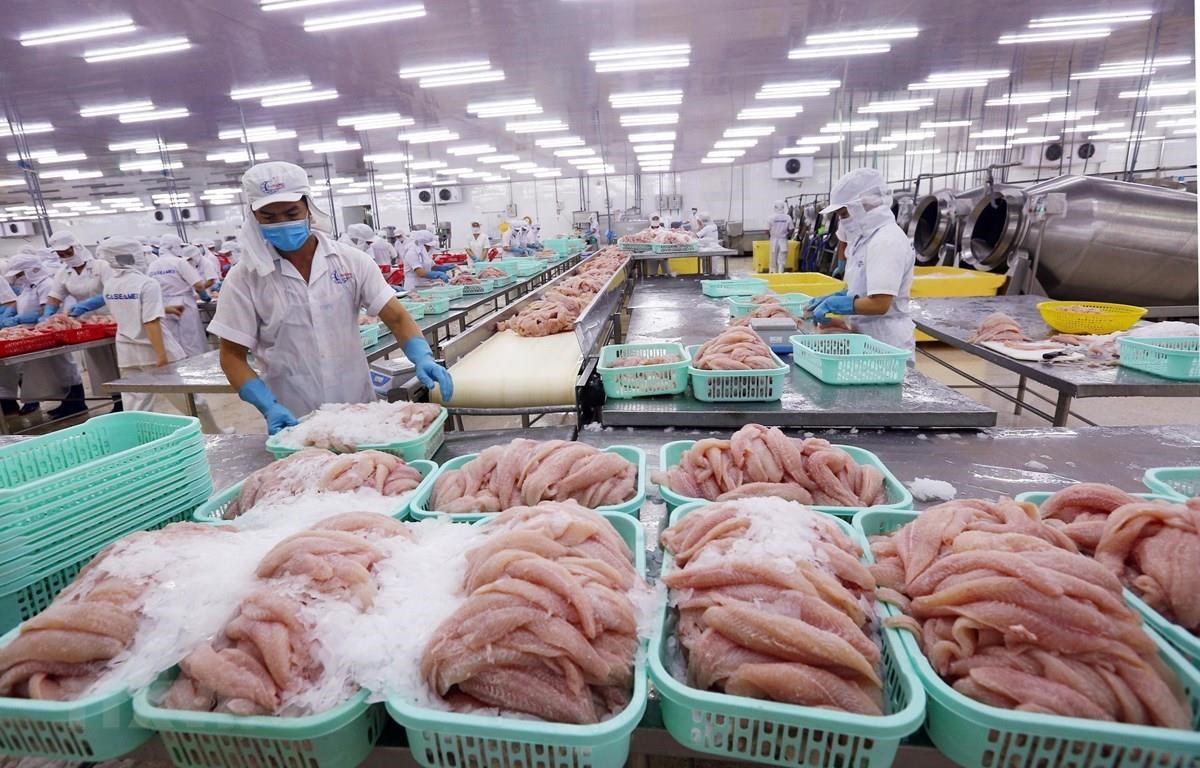
Tra fish processed for exports (Photo: VNA)
An appealing investment destination
Vietnam is one of the best growing economies in the region which has become an attractive destination for investment from all over the globe, said the Bangkok Post in a news story last week.
“The government of Vietnam has put a lot of effort into making the country a good host for incoming investment and companies,” the Thai newspaper said. “Several companies have moved their units across the border to Vietnam from China. They include tech companies like Nokia, Samsung and Olympus, as well as shoe manufacturers such as Nike and Adidas.”
It added that the ease of doing business index for Vietnam is at 69th in 2019. “Vietnam has maintained a GDP growth rate of more than 6 percent since 2000, whereas other neighboring Southeast Asian countries have faltered badly due to the trade wars,” it said.
A key factor in Vietnam that attracts industries is the lucrative corporate tax rate for large firms that are looking to relocate. “A few large firms in Vietnam have managed to get tax rates as low as zero for the first five years, 5 percent for the next decade and 10 percent for the subsequent next two,” it explained.
In a recent seminar in the United States, Deborah Elms, executive director of the Asian Trade Centre in Singapore, said Vietnam was doing well in improving its internal capacity to cope with the effects of the US-China trade war and lure more foreign investment.
Vietnam has so far signed 12 free trade agreements with foreign partners around the globe, including the Comprehensive and Progressive Trans-Pacific Partnership (CPTPP). In June, Vietnam inked an FTA and an Investment Protection Agreement with the European Union (EU).
According to Reuters, foreign direct investment (FDI) is crucial for Vietnam to maintain economic growth since the FDI firms account for about 70 percent of the country’s total exports.
Russia’s Regnum news agency also hailed Vietnam for jumping 15 places on the ranking of best economies to invest in, surging past other regional peers like Malaysia, Singapore and Indonesia.
Jumps in competitive rankings
The World Economic Forum (WEF)’s 2019 Global Competitiveness Index (GCI) report revealed that Vietnam rose 10 spots from last year to land at 67th out of 141 economies, making it the most improved country this year.
Against the backdrop of weakening global economy, Vietnam standouts the most with a robust and stable economic growth, said Professor Vladimir Mazyrin, Director of the Centre for Vietnamese and ASEAN studies at the Institute for Far Eastern Studies of the Russian Academy of Science.
The key to such an impressive growth remains in the country’s ability to provide a favorable business climate and corporate supports, particularly for small and medium enterprises (SMEs), he said.
The Vietnamese government has taken drastic moves to boost the economy, he continued, highlighting the signing of a number of new-generation FTAs; streamlining of business conditions and verification procedures; the launch of e-government and the digital economy; and encouragement of startup businesses.
Vietnam jumped three ranks on the 2019 Global Innovation Index (GII) to place 42nd out of 129 economies. It is the highest-ranking Vietnam has ever achieved.
Sacha Wunsch Vincent, head of the WIPO’s Composite Indicator Research Section, Economics and Statistics Division and Co-Editor of the GII, hailed Vietnam as a model country among those surveyed by the WIPO over the past three years.
The country also climbed in the ranking of best countries in which to invest this year issued by the US News and World Report, up from 23rd last year to eighth out of 29 economies. According to the report, “Doi Moi” (renewal) economic policy reforms beginning in 1986 have helped Vietnam transition to becoming a more modern, competitive nation.
It was voted as the second-best destination for expats to live and work in 2019 in an Expat Insider survey published by InterNations. The country moved up 12 steps in just one year from the 14th out of the 68 destinations last year, said InterNations, the world’s largest expat community with 3.6 million members.
Promising economic outlook
Economists have lifted growth projections for Vietnam after the latest data showed the economy surged more than 7 percent in the third quarter, according to Bloomberg.
Citigroup Inc. revised its full-year forecast of Vietnam’s GDP to 6.9 percent from 6.7 percent, on the basis of another solid performance in the fourth quarter.
Analysts at Maybank Kim Eng Research Ltd. also upgraded their forecast of Vietnam’s economic expansion to 7 percent from their previous prediction of 6.8 percent.
According to two economists of Maybank – Linda Liu and Chua Hak Bin, rising foreign direct investment and “buoyant domestic demand, as suggested by the recent robust retail sales growth”, will keep the momentum going through the year-end and in early 2020.
Currently, many international financial institutions are issuing very positive assessments about the prospects of Vietnam's economy in the coming time.
HSBC predicted that inflation in Vietnam will be kept below 2.7 percent, while GDP growth is expected to ease to 6.7 percent in the whole year.
Edward Lee, the chief economist for ASEAN and South Asia at Standard Chartered Bank Global Research, said he believes that Vietnam will be the fastest growing economy in ASEAN this year with a projected growth reaching 6.9 percent, and this is expected to continue until 2021.
Vietnam’s economy has performed well in 2019, with GDP expanding by an estimated 6.8 percent, while public debt reduced by nearly 8 percentage point of GDP since 2016, and a trade balance surplus for the fourth year in a row, the World Bank (WB) said in a report released earlier this month. It described the results as remarkable amid the global downturn.
The WB emphasized the resilience of the Vietnamese economy, saying GDP growth has continued to be driven by a strong external sector with exports expanding by about 8 percent this year, nearly four times faster than the world average.
The country has also remained an attractive destination for foreign investors, with FDI inflows averaging 3 billion USD per month. In addition, private consumption has emerged as an important contributor to GDP growth as the result of an expanding middle-income class and rising wages. Private firms also increased investment by 17 percent during the same period./.
VNA
 Central bank mulls raising gold position limit for lenders
Central bank mulls raising gold position limit for lenders



